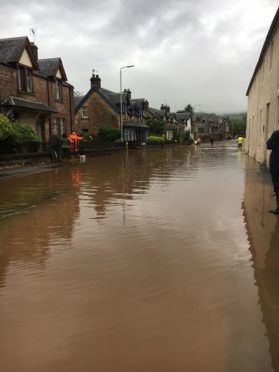Dingwall residents say that due to council cutbacks, vital culverts and gullies are not being maintained, and the local knowledge about them has been all but lost.
On July 10 almost two inches of rainwater fell in 45 minutes, with roads, offices and homes badly affected.
A drop-in session for the public afterwards was attended by more than 60 people who raised a gamut of questions about the situation, community services manager Carron McDairmid told the councillors.
She said: “A project team has been set up and a flood study is to be submitted, with another drop-in session arranged for Monday September 16 at Dingwall Academy.”
Dingwall community councillor and former council maintenance worker Andrew Macivor has been working closely with the council to share his local knowledge.
He said: “I showed council officers drains and gullies they didn’t know existed.
“Since 2010, a generation of knowledge has been lost as people retired or left and weren’t replaced.
“We used to do regular maintenance on the gullies and culverts once a month because were knew small problems would only get worse.
“Now there are only 11 men between the Black Isle and Wester Ross.
“When the recent floods happened, they had to call people in from leave because there aren’t enough people.”
Mr Macivor said a local response team should be formed, with communications across all council departments and the involvement of local people.
He said: “Filling sandbags, important as it is, shouldn’t be left to the maintenance men, there are other departments who could do that.
“You only need to put the word out and Dingwall people would do it in a flash.”
Mr Macivor added: ““We also have concerns about the state of the main sewer and the pumps at Jubilee Park which are Scottish Water’s responsibility.”
A Scottish Water spokesperson said: “Our local team were on site during the severe flooding incident that affected Dingwall on the evening of Wednesday 10 July to ensure that the pumping station at Jubilee Park was operating to its full capacity.
“The pumps operated throughout the incident but were not able to cope with the volume of surface water until the storm passed.
“Our team identified and cleared a localised constraint in one of our sewers near Simpson Place, caused by build-up of fats, oils and greases.
“This was not preventing the sewer from operating or causing flooding, but had potential to result in a blockage in the future so was cleared.”
